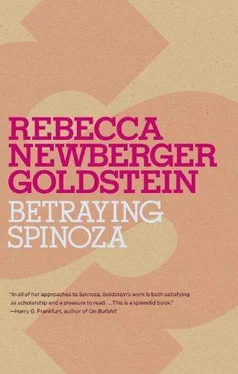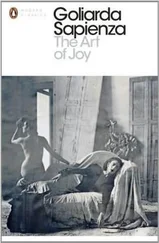Rebecca Goldstein - Betraying Spinoza - The Renegade Jew Who Gave Us Modernity
Здесь есть возможность читать онлайн «Rebecca Goldstein - Betraying Spinoza - The Renegade Jew Who Gave Us Modernity» весь текст электронной книги совершенно бесплатно (целиком полную версию без сокращений). В некоторых случаях можно слушать аудио, скачать через торрент в формате fb2 и присутствует краткое содержание. Год выпуска: 2009, ISBN: 2009, Издательство: Random House, Inc., Жанр: Биографии и Мемуары, на английском языке. Описание произведения, (предисловие) а так же отзывы посетителей доступны на портале библиотеки ЛибКат.
- Название:Betraying Spinoza: The Renegade Jew Who Gave Us Modernity
- Автор:
- Издательство:Random House, Inc.
- Жанр:
- Год:2009
- ISBN:978-0-80524273-7
- Рейтинг книги:5 / 5. Голосов: 1
-
Избранное:Добавить в избранное
- Отзывы:
-
Ваша оценка:
- 100
- 1
- 2
- 3
- 4
- 5
Betraying Spinoza: The Renegade Jew Who Gave Us Modernity: краткое содержание, описание и аннотация
Предлагаем к чтению аннотацию, описание, краткое содержание или предисловие (зависит от того, что написал сам автор книги «Betraying Spinoza: The Renegade Jew Who Gave Us Modernity»). Если вы не нашли необходимую информацию о книге — напишите в комментариях, мы постараемся отыскать её.
Betraying Spinoza: The Renegade Jew Who Gave Us Modernity — читать онлайн бесплатно полную книгу (весь текст) целиком
Ниже представлен текст книги, разбитый по страницам. Система сохранения места последней прочитанной страницы, позволяет с удобством читать онлайн бесплатно книгу «Betraying Spinoza: The Renegade Jew Who Gave Us Modernity», без необходимости каждый раз заново искать на чём Вы остановились. Поставьте закладку, и сможете в любой момент перейти на страницу, на которой закончили чтение.
Интервал:
Закладка:
Scholars still ponder the actions of the Amsterdam Jews, propounding theories to explain the unusual vehemence and finality of the denunciation pronounced against the young philosopher. Others had questioned principles of the faith and been meted out their penance and then returned. Why was Spinoza alone deemed irredeemable? The answer is, I believe, entangled in a set of issues that were especially fraught for this community of first-and second-generation refugees from the Spanish-Portuguese Inquisition, struggling to reclaim their Jewish identities. Having thrown off their enforced Christianity, they were trying, very consciously and deliberately, to shape their new identities as Jews. What other Jews might have taken for granted, they could not. The preoccupations of the community were ordained to clash violently with its most famous son.
It is no accident that this particular community, which felt the force of the issue of Jewish identity with unusual passion, should have produced a thinker who still, to this day, confounds us on this very issue. Spinoza probes a historical sore spot for Jews, one which throbbed with special intensity within his own community, but remains tender still. What does Jewishness consist in? Is it theological, biological, ethical, cultural? Are there traits of outlook that define or explain what it is to be Jewish? Is Jewishness an essential attribute for a Jew, part of what makes the person the very person that he is, so that once a Jew, always a Jew? Is it inherited, and if so, is it dominant, or recessive? Just what sort of an attribute is Jewishness?
The Jewish calamity of the Spanish-Portuguese Inquisition had forced these questions into the forefront of the consciousness of Spinoza’s Jewish community (just as the Jewish calamity of the Holocaust has forced these questions back into an embarrassed silence). The answers Spinoza was to give touched the exposed nerve of communal Jewish passions. They still do.
Even should one decide that Spinoza cannot be considered a Jewish thinker — that he belongs only to the greater world but not particularly to the Jews — the process of drawing this conclusion reveals the tangled difficulties of coming to terms with the meaning of Jewishness. Spinoza certainly struggled with these issues, though one must probe beneath the mathematical austerity of his system to discover the buried signs of his struggle. Perhaps the indication that he wrestled with the question of Jewishness is in itself sufficient claim to Jewishness. And perhaps, too, the sense of an intense, if covert, conflict over the issue of Jewish identity provides at least part of the explanation of why generations of Jews have felt a mysterious kinship with this philosopher whose system would seem, on the surface, to offer no special meaning or message for Jews.
The philosopher is firm in the denial that any true philosophy could offer some special meaning to some particular group of people. The truth makes no such distinctions. From its remote point of view, that is, the point of view of truth itself, the sort of differences around which groups construct their social identities and distinguish between “them” and “us” could not appear more inconsequential. From the point of view of truth itself, the view that Spinoza dubs “the Infinite Intellect of God,” those differences that loom so large in human affairs are not represented at all. These differences emerge only in our limited points of view — finite, all too finite. These insistences on difference are all confused, albeit understandable— all is understandable — attempts to substantiate that peculiar and necessary significance one confers on one’s self by erecting a view of all reality that would do justice to it. So it is that religions distinguish themselves from one another by declaring their own adherents the favored of God. All such confusions are relegated by Spinoza to the status of superstitions, including any and all difference to which Jews may cling.
The name “Spinoza” derives from the word for “thorn” in Portuguese, which was the language of the Amsterdam Jewish community in which he had been reared and out of which he had been cast. It was the language in which Spinoza remained the most comfortable throughout his life, no doubt the language in which he thought out his incomparable philosophy. The language in which the most universal of systems was excogitated — a system designed to bleach out any reference to personal points of view determined by the contingencies of historical narratives — was itself maculate with the extraordinary history of Spinoza’s community.
The name Spinoza strangely suits. Spinoza, as a Jew, presents himself to us adorned in a crown of eternally thorny questions.
II
In Search of Baruch
The Senhores of the ma’amad , 1having long known of the evil opinions and acts of Baruch de Espinoza, have endeavored by various means and promise, to turn him from his evil ways. But having received more and more serious information about the abominable heresies which he practiced and taught and about his monstrous deeds, and having for this numerous trustworthy witnesses who have deposed and borne witness to this effect in the presence of the said Espinoza, they became convinced of the truth of this matter; and after all of this has been investigated in the presence of the honorable hakhamim 2they have decided, with their consent, that the said Espinoza should be excommunicated and expelled from the people of Israel.
By decree of the angels and by the command of the holy men, we excommunicate, expel, curse and damn Baruch de Espinoza, with the consent of God, Blessed be He, and with the consent of the entire holy congregation, and in front of these holy scrolls with the 613 precepts which are written therein, cursing him with the excommunication with which Joshua banned Jericho and with the curse which Elisha cursed the boys and with all the castigations that are written in the Book of the Law. Cursed be he by day and cursed be he by night; cursed be he when he lies down and cursed be he when he rises up. Cursed be he when he goes out and cursed be he when he comes in. The Lord will not spare him, but then the anger of the Lord and his jealousy shall smote against that man, and all the curses that are written in this book shall lie upon him, and the Lord shall blot out his name from under heaven. And the Lord shall separate him unto evil out of all the tribes of Israel, according to all the curses of the covenant that are written in this book of the Law. But you that cleave unto the Lord your God are alive every one of you this day.
We warn that none may contact him orally or in writing, nor do him any favor, nor stay under the same roof with him, nor read any paper he made or wrote.
— Congregation Talmud Torah, July 27, 1656
Without intelligence there is not rational life, and things are only good in so far as they aid man in his enjoyment of the intellectual life which is defined by intelligence. Contrariwise, whatsoever things hinder man’s perfection of his reason, and capability to enjoy the rational life, are alone called evil.
— BENEDICTUS SPINOZA
The Ethics , Part I V, Appendix V
I first heard the name Baruch Spinoza uttered as an admonition, a cautionary tale of unbridled human intelligence blindly seeking its own doom.
This is what happens, the voice of my teacher warned, when someone thinks that human reason is sufficient unto itself and that the truth divinely given to us can be ignored. This is what happens when philosophy takes the place of Torah.
Baruch Spinoza had come from a good family of God-fearing Jews, similar to your families, girls — all too similar in certain ways. Like so many of your parents and grandparents, your aunts and uncles and cousins, Spinoza’s family had suffered al-Kiddush ha-Shem , for the sanctification of the Holy Name. No, not in Germany or Austria or Poland. Not in Hungary, Rumania, or Russia. The persecution had been in Spain and Portugal, starting in the fifteenth century and continuing for hundreds of years.
Читать дальшеИнтервал:
Закладка:
Похожие книги на «Betraying Spinoza: The Renegade Jew Who Gave Us Modernity»
Представляем Вашему вниманию похожие книги на «Betraying Spinoza: The Renegade Jew Who Gave Us Modernity» списком для выбора. Мы отобрали схожую по названию и смыслу литературу в надежде предоставить читателям больше вариантов отыскать новые, интересные, ещё непрочитанные произведения.
Обсуждение, отзывы о книге «Betraying Spinoza: The Renegade Jew Who Gave Us Modernity» и просто собственные мнения читателей. Оставьте ваши комментарии, напишите, что Вы думаете о произведении, его смысле или главных героях. Укажите что конкретно понравилось, а что нет, и почему Вы так считаете.












